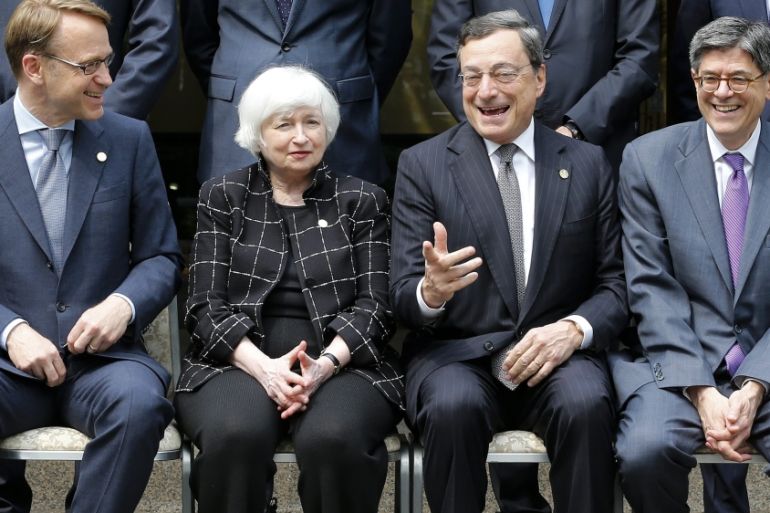G7 promises aggressive action on ‘financing terrorism’
Talks in Japan focus on “terror-funding” and tax evasion, but finance ministers disagree on how to boost global growth.

The Group of Seven major economies has pledged aggressive action in the fight against “financing terrorism and extremism”.
Following talks in northern Japan on Saturday, finance leaders of the G7 issued an “action plan” calling for increased exchanges of information on financial intelligence, reducing the level of cross-border transactions subject to disclosure and collaborate on targeted sanctions for financial networks of outlawed groups.
Keep reading
list of 4 itemsWhy is Germany maintaining economic ties with China?
Behind India’s Manipur conflict: A tale of drugs, armed groups and politics
China’s economy beats expectations, growing 5.3 percent in first quarter
The announcement came after two days of meetings ahead of a G7 summit to be held in central Japan’s Ise region next week.
The officials spent Friday discussing ways to use monetary policy, government spending and longer-term reforms to help support growth.
“All of us were really able to have a candid discussion and to reaffirm the important role of the G7,” said Japanese Finance Minister Taro Aso.
Disagreements on growth
Having agreed to only tacit coordination of their varying strategies for boosting growth, the G7 finance meeting turned on Saturday to issues such as what the group called terrorism financing, tax evasion and support for fighting pandemics.
Aso played down suggestions of major differences over the leeway for more government spending by countries struggling to keep deficits under control, saying each country must adapt policies to suit their own troubles and finances.
Most of the governments of the G7 favour more proactive government spending to help support flagging growth, while Germany has remained more conservative on fiscal matters, regarding structural reforms as crucial.
WATCH: Is ISIL facing a cash crunch?
US Treasury Secretary Jack Lew said governments and businesses needed to use all possible “policy levers” to spur growth.
The consensus was that while there is no one-size-fits-all approach, all economies are facing a stifling lack of demand, as factories churn out more cars, clothing and computers than consumers are willing to buy.
One looming problem for Japan is whether or not to raise its national sales tax next year from 8 percent to 10 percent. Aso has said the tax hike will go ahead barring any major crises or disasters.
Tax evasion on agenda
But a senior US Treasury official said it would be unfortunate if the sales tax hike ends up being a drag on the economy.
The official, who spoke on condition he was not further identified, said “offsets” such as other tax breaks might be needed to compensate for the tax hike, to prevent a serious downturn.
Japanese officials have also said they fear that raising the tax will hurt demand to the extent it could reduce rather than increase government revenues.
|
|
The issues of tax evasion and financial transparency were also on the agenda, following the release of the so-called Panama papers, which disclosed details of offshore companies set up for companies and wealthy individuals by the Panama-based law firm Mossack Fonseca.
Companies registered in tax havens are often used for legitimate business purposes, but also can facilitate tax evasion and money laundering.
Currencies are another hot-button issue for the financial czars.
Lew said he hoped the talks would keep on track commitments made during recent discussions in China by the wider Group of 20 major economies, where members pledged to not manipulate exchange rates to their own advantage.
Elsewhere, the group warned of the risks from a “shock” to the world economy if Britain votes to leave the European Union next month.
“Uncertainties to the global outlook have increased, while geopolitical conflicts, terrorism, refugee flows, and the shock of a potential UK exit from the European Union also complicate the global economic environment,” they said after the two-day talks.